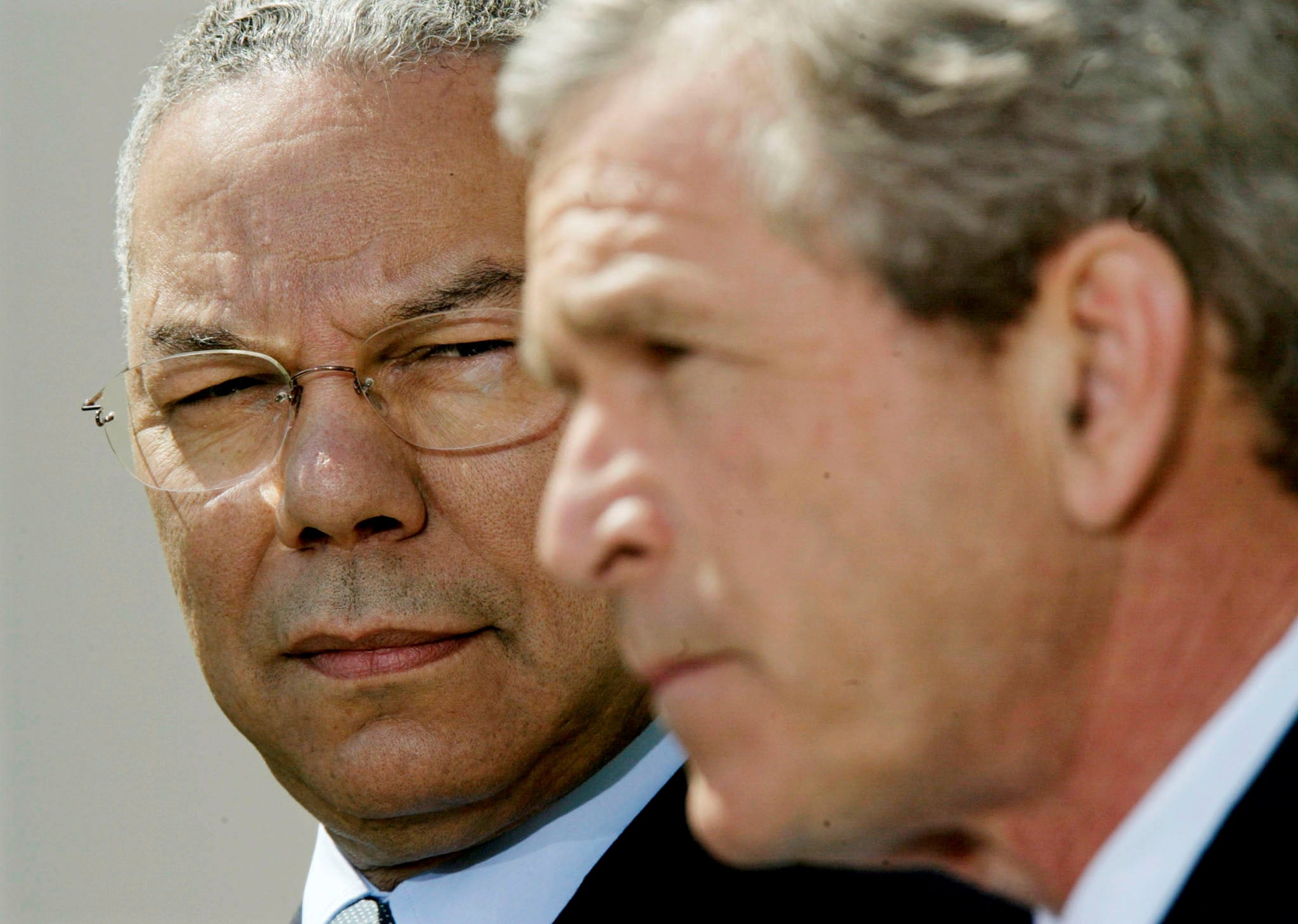As an Iraqi, I’d sooner mourn my country than treat Colin Powell as a hero
The former secretary of state’s career was marred by tragedy – that is, tragedy imposed on others by American policy he oversaw

Your support helps us to tell the story
From reproductive rights to climate change to Big Tech, The Independent is on the ground when the story is developing. Whether it's investigating the financials of Elon Musk's pro-Trump PAC or producing our latest documentary, 'The A Word', which shines a light on the American women fighting for reproductive rights, we know how important it is to parse out the facts from the messaging.
At such a critical moment in US history, we need reporters on the ground. Your donation allows us to keep sending journalists to speak to both sides of the story.
The Independent is trusted by Americans across the entire political spectrum. And unlike many other quality news outlets, we choose not to lock Americans out of our reporting and analysis with paywalls. We believe quality journalism should be available to everyone, paid for by those who can afford it.
Your support makes all the difference.The news of Colin Powell’s passing has been met with a string of obituaries celebrating his achievements. Multiple statements have been released venerating him as the first black Secretary of State, the man who “shaped US national security”, the first black National Security advisor and a two-time recipient of the Presidential Medal of Freedom. Former president George W. Bush called Powell “a great public servant”; Joe Biden proclaimed that Powell was “a dear friend and a patriot of unmatched honor and dignity”.
But for me, as an Iraqi, the memory of the former US Secretary of State will forever be marred by his role in forcing through the disastrous Iraq war. History should never be rewritten in the wake of a politician’s demise, and my country knows that better than most.
Powell’s so-called dignity was missing when he knowingly deceived the UN Security Council in February 2003 in his bid to push through the Iraq war. Publicly, Powell showed “no doubt in [his] mind” of the presence of weapons of mass destruction in Iraq, announcing to the Council that “every statement I make today is backed up by sources, solid sources. These are not assertions. What we’re giving you are facts and conclusions based on solid intelligence”. Privately, according to his former chief of staff, Larry Wilkerson, Powell hesitated: “I wonder how we’ll all feel if we put half a million troops in Iraq and march from one end of the country to the other and find nothing,” he reportedly said.
To brush over these doubts, Powell resorted to presenting fabricated evidence. According to Bob Woodward’s ‘Plan of Attack’, Powell claimed that the Iraqi Republican Guard had created “a system of hiding things and moving things out of the way”. Powell presented an intercepted memo from Iraq as evidence which showed a request “to clean out all of the areas, the scrap areas, the abandoned areas. Make sure there is nothing there”. The original message, however, as per the State Department read, “to inspect the scrap areas and the abandoned areas”.
Recognizing his own misjudgements in the lead-up to the war, Powell later suggested that his role in presenting falsified evidence “was painful”, but showed concern as to how it “tarnished his reputation”. Such a blot on Powell’s character will do nothing to bring justice to those that have died as a result of his and the rest of George W. Bush administration’s war mongering.
The 2003 US invasion was not Powell’s only involvement with Iraq. In fact, his record had already been tarnished previously. After US airstrikes destroyed Iraq’s only infant formula factory in the 1991 Gulf War, the then chairman of the Joint Chiefs of Staff – Colin Powell – pronounced, without evidence, “It is not an infant formula factory. It was a biological weapons facility — of that we are sure.”
Powell’s peddling of lies for America’s military industrial complex appears to have followed something of a trend. In the lead-up to the first Gulf War, in what has been labelled as the ‘Powell Doctrine’, Powell advocated for the maximum use of force once certain perquisites for military intervention had been met. Such a policy ultimately saw retreating Iraqi soldiers, who posed no threat to American national security, to be annihilated on what is now referred to as the ‘Highway of Death’.
Powell’s controversial involvement in war was not limited to the Middle East. After the Mỹ Lai massacre, which saw as many as 500 unarmed Vietnamese civilians killed, Powell, then a US Army Major, was sent to investigate rumours of atrocities committed by his colleagues. He has since been accused of downplaying the US role in the potential war crime, instead reporting that “relations between American soldiers and the Vietnamese people are excellent”.
As an Iraqi, it disappoints me to see that much of the focus surrounding Powell’s death has been around his Covid vaccination status. The real tragedy of Colin Powell’s passing is that the millions of Iraqis who continue to suffer from his past actions will never see justice. The lives we should be mourning are the hundreds of thousands of Iraqis who died as a consequence of Powell’s actions – actions for which he will never be brought to justice. Before it’s too late, we must hold to account George W. Bush, Dick Cheney and the other surviving engineers of the catastrophe Iraq endures to this day.
Join our commenting forum
Join thought-provoking conversations, follow other Independent readers and see their replies
Comments